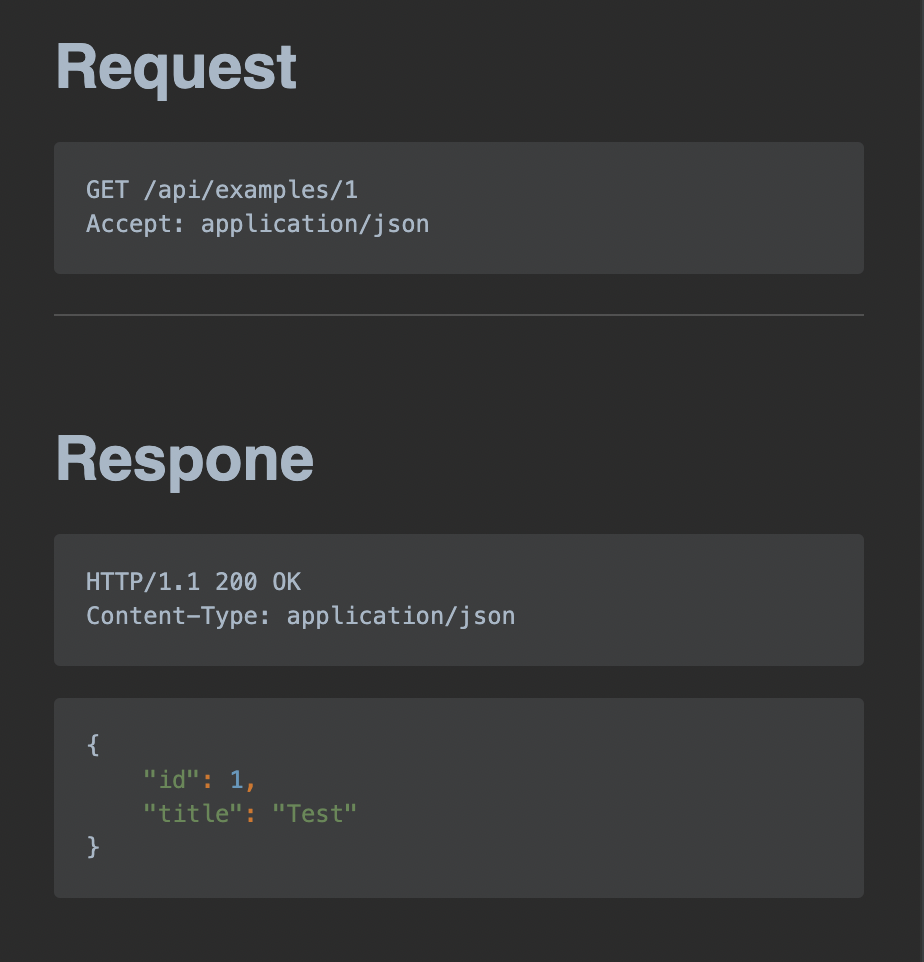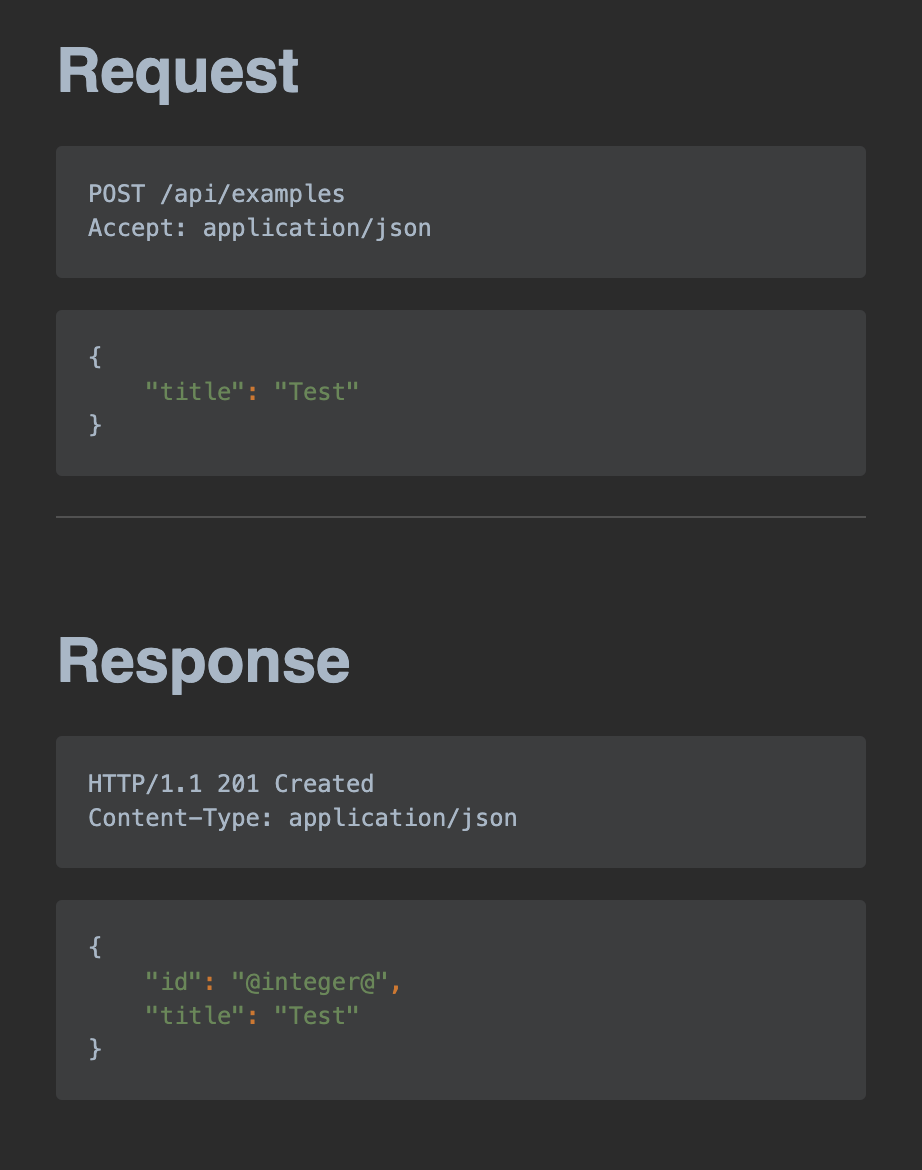Testing APIs using Markdown and PHP Matcher
My experience is that almost every API test follow the same workflow. Fixtures are loaded in setupBeforeClass or in a bootstrap file of your test framework. A request will be sent and the response should match.
In the last projects I have matched the content against an own .json
file for my tests. To do that I need to adopt the request in my
Test file but the expected result is in another own .json file, which make the maintainance a little bit difficult because I need to find
the correct .json file for the correct test case.
After I stumbled over the test cases in the rectorphp library, I was thinking about how I could adopt this also for API tests. I wanted to get my API tests into a format which remove the whole boilerplate of creating the tests and also have the request and response in the same file.
Creating a framework independent format
First I thought about moving all into a json format like the following:
{
"request": {
"method": "POST",
"uri": "/api/examples/1",
"headers": {
"Accept": "application/json"
},
"content": {
"title": "Test"
}
},
"response": {
"statusCode": 200,
"headers": {
"Accept": "application/json"
},
"content": {
"id": "@integer@",
"title": "Test"
}
}
}But I think that JSON is not very readable and has the disadvantage that we can not add any comment to it.
So I had the idea to use a markdown flavoured format for this:
# Request
```http request
POST /api/examples
Accept: application/json
{
"title": "Test"
}
```
---
# Response
```http request
HTTP/1.1 200 OK
Content-Type: application/json
{
"id": "@integer@",
"title": "Test"
}
```The format is really great because it matches the HTTP protocol nevertheless it has one downside. Compared to JSON, autocompletion and code highlighting are missing in the IDE. To fix this, I split the content into an own code block of the markdown file:
# Request
```http request
POST /api/examples
Accept: application/json
```
```json
{
"title": "Test"
}
```
---
# Response
```http request
HTTP/1.1 200 OK
Content-Type: application/json
```
```json
{
"id": "1",
"title": "Test"
}
```There it is, the format how we are able to write tests. Now its time to use it.
Creating a basic test case
To create our basic test case we first need a method to read our markdown files. We will use the symfony/finder component to read only the files we need.
<?php
namespace App\Tests\Functional;
use Symfony\Bundle\FrameworkBundle\Test\WebTestCase;
use Symfony\Component\Finder\Finder;
abstract class AbstractApiTest extends WebTestCase
{
/**
* @return \Generator<\SplFileInfo>
*/
protected function yieldFilesFromDirectory(string $directory): \Generator
{
$finder = new Finder();
$finder->in($directory)
->ignoreVCS(true)
->files()
->name('*.md');
foreach ($finder as $file) {
if ($file instanceof \SplFileInfo) {
yield [$file];
}
}
}
}Now we need to add a method to parse the markdown file and make our expected assertions:
protected function doTestFileInfo(\SplFileInfo $fileInfo): void
{
// arrange
$content = \file_get_contents($fileInfo->getPathname());
[$input, $output] = \explode("\n---\n", $content);
[$method, $uri, $headers, $content] = $this->parseRequest($input);
[$expectedServerProtocol, $expectedStatusCode, $expectedHeaders, $expectedContent] = $this->parseResponse($output);
/** @var array<string, string> $server */
$server = [];
foreach ($headers as $key => $value) {
$servers['HTTP_' . strtoupper(str_replace('-', '_', $key))] = $value;
}
// act
$client = $this->createClient();
$client->request($method, $uri, [], [], $server, $content);
// assert
$response = $client->getResponse();
$this->assertSame($expectedServerProtocol, $response->getProtocolVersion());
$this->assertSame($expectedStatusCode, $response->getStatusCode());
foreach ($expectedHeaders as $headerName => $expectedHeaderValue) {
$this->assertSame($expectedHeaderValue, $response->headers->get($headerName));
}
$this->assertSame($expectedContent, $response->getContent());
}To get the information I need, I parsed the markdown file with a regex.
parseRequest Function
/**
* @return array{
* 0: string,
* 1: string,
* 2: array<string, string>,
* 3: string,
* }
*/
private function parseRequest(string $input): array
{
preg_match('/```http request\n(\w+) (.+)\n([^```]*)```([^```]*```\w+\n([^```]*)```)?/', $input, $matches);
$method = $matches[1];
$uri = $matches[2];
$headerString = $matches[3];
$content = $matches[5] ?? '';
$headers = [];
$headerParts = array_filter(explode("\n", $headerString));
foreach ($headerParts as $headerPart) {
[$headerName, $headerValue] = \explode(':', $headerPart, 2);
$headers[trim($headerName)] = trim($headerValue);
}
return [$method, $uri, $headers, $content];
}parseResponse Function
/**
* @return array{
* 0: string,
* 1: int,
* 2: array<string, string>,
* 3: string,
* }
*/
private function parseResponse(string $output): array
{
preg_match('/```http request\n\w+\/(\d+.\d+) (\d+) \w+\n([^```]*)```([^```]*```\w+\n([^```]*)```)?/', $output, $matches);
$serverProtocol = $matches[1];
$statusCode = (int) $matches[2];
$headerString = $matches[3];
$content = $matches[5] ?? '';
$headers = [];
$headerParts = array_filter(explode("\n", $headerString));
foreach ($headerParts as $headerPart) {
[$headerName, $headerValue] = \explode(':', $headerPart, 2);
$headers[trim($headerName)] = trim($headerValue);
}
return [$serverProtocol, $statusCode, $headers, $content];
}And then used the parsed data to send the request over the symfony web test case. The parsed data of the response is used for the assertions against the response object. We are matching here all relevant data the Protocol Version, Status Code, Headers and Content.
Now we can use our AbstractApiTest in our own Test by testing our rest endpoint:
<?php
namespace App\Tests\Functional\Controller;
use App\Tests\Functional\AbstractApiTest;
class ExampleControllerTest extends AbstractApiTest
{
/**
* @dataProvider provideData()
*/
public function testFixtures(\SplFileInfo $fileInfo): void
{
$this->doTestFileInfo($fileInfo);
}
/**
* @return \Generator<\SplFileInfo>
*/
public function provideData(): \Generator
{
return $this->yieldFilesFromDirectory(__DIR__ . '/fixtures');
}
}In the testMethod itself or in the setupBeforeClass class you even could still
make sure that you are loading some database fixtures which are required for your test case.
Now we can create our test cases in our markdown files like the followings:
I think it is really nice as it forces the developer to work in a format based on the HTTP Protocol Standard.
Fix problem with dynamic response content
While it is hard when you example work with date times, auto generated ids to exact match the response against a json. There is a solution for this by using the coduo php matcher.
This library allows you to write something like:
{
"id": "@integer@",
"text": "@string@.startsWith('Test')"
}To use expression or type matching instead of exact matching.
So instead of:
$this->assertSame($expectedContent, $response->getContent());$this->assertMatchesPattern($expectedContent, $response->getContent());From the Coduo\PHPMatcher\PHPUnit\PHPMatcherAssertions Trait.
This way we can use all coduo patterns inside our response content.
Optimizing the output format in PHPUnit
I personally prefer to use the nunomaduro\collision package
as a printer for my PHPUnit tests. As it output the tests
in a nice readable way:
Still it does not indicate here a lot but with a little change in our API test case by using a key in our test generator this way:
-yield [$file];
+yield \str_replace(\getcwd() . '/', '', $file->getPathname()) => [$file];It will output the test in the following format:
Now the nice thing is as we are using the path from getcwd() (current directory)
we are able to directly click in our terminal on the .md file path to open the
test case file and adopt it to our needs when required.
By using the filename as key it is also possible to filter by the specific test case via phpunit:
vendor/bin/phpunt --filter="example_post.md"This way only the example_post.md is exectued.
Conclusion
With the usage of a more general format we got rid of a lot of boilerplate code for our api tests. With the usage of markdown files we even make it possible to better document our test cases as we could add test for them. Also I like to use the response and request format of the official http standard.
The tests could also be ported to another framework if the framework of your application is changing or even to another language. You just would need to reimplement your base test case again.
Also if you don't want to use markdown files I recommend using the coduo/php-matcher instead of manual matching your response data. Because your tests should also fail if you are adding a new key to your response object. So you can be sure that new added keys are also added to your test cases.
If you want to test it yourself feel free to clone this repository and run and adopt its tests:
git clone https://github.com/alexander-schranz/markdown-based-api-testing
composer install
vendor/bin/phpunitTell me what you think about this way of testing your api. I am also interessted in existing api test frameworks that work in a similar way. Attend the discussion about this on Twitter.



